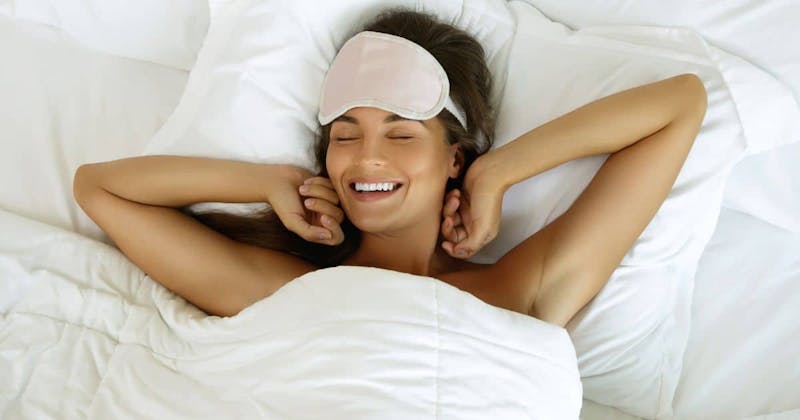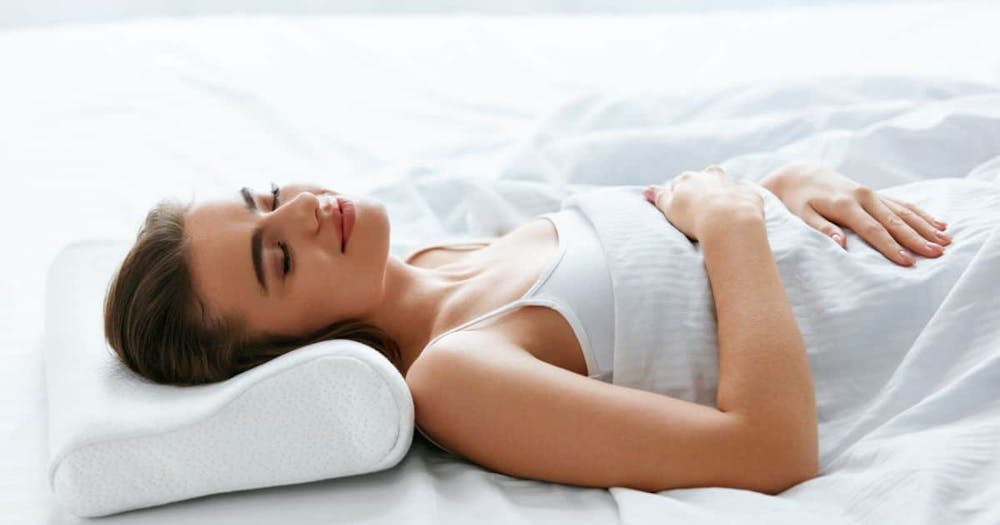
Sleep is a crucial component of the breast augmentation recovery process. It plays a critical role in allowing the body to heal and minimize potential complications. When we sleep, our bodies enter a state of deep rest and repair, enabling our tissues to undergo the necessary healing processes.
During this period, adequate sleep helps to decrease inflammation and reduce discomfort, allowing individuals to feel more comfortable during their healing journey. Therefore, prioritizing quality sleep is of utmost importance for those seeking a smooth and efficient recovery from breast augmentation surgery.
Have you recently undergone a breast enhancement? Incorporate these tips into your post-breast augmentation surgery routine to aid in better sleep, promote a smooth recovery process, and help ensure optimal results.
CREATE A COMFORTABLE SLEEPING ENVIRONMENT

Creating a comfortable sleeping environment is a great way to ensure a restful night’s sleep. Make sure your bed is properly set up for maximum comfort. Use soft pillows, such as memory foam, plush, or down pillows. Additionally, ensure you sleep on a supportive mattress equipped with cozy blankets to help you relax and sleep well. For the best possible sleep environment, try to keep your bedroom between 60 and 72 degrees Fahrenheit.
Additionally, avoid stimulating activities before bed. This includes watching television or using electronics, such as mobile phones or laptops, right before bedtime. The blue light emitted by electronic devices can interfere with your sleep. Instead, engage in calming activities like reading a book, writing in a journal or listening to soothing music.
ELEVATE YOUR UPPER BODY
After breast augmentation surgery, sleeping with your upper body slightly elevated can help reduce swelling and discomfort. Several methods can be used to elevate your body after breast augmentation surgery.
A straightforward way to elevate your body is by using bed pillows. You can place pillows behind your back to create a comfortable incline. This helps to reduce swelling and promote healing. Another option is a wedge pillow specifically designed to elevate your upper body. This pillow is shaped like a triangle, which provides a gradual incline for your back and neck. It can be more supportive and provide a better angle for elevation.
An adjustable bed can also be a great tool for elevating your body after surgery. These beds allow you to change the position of the mattress and raise the head portion to a desired elevation level. As a result, this makes it easier to find a comfortable position and maintain proper body alignment. Alternatively, foam blocks or cushions can be placed under your mattress to elevate the upper body. These can be adjusted based on your comfort level and provide a stable and secure elevation.
Lastly, a recliner chair can be very beneficial after breast augmentation surgery. By reclining back and elevating your feet, you achieve a comfortable position that promotes blood circulation and reduces swelling.
AVOID SLEEPING ON YOUR STOMACH OR SIDES

There are several reasons why it is not recommended to sleep on your stomach or sides for the first few weeks after undergoing breast augmentation surgery. Avoiding these positions to ensure a smooth and successful breast augmentation recovery is crucial.
First off, sleeping on your stomach or sides can exert pressure on your newly enhanced breasts. This pressure can cause the implants to shift from their desired position. It can even cause them to rupture and lead to the need for additional surgeries and potential complications.
Additionally, sleeping on your stomach or side can also hinder proper healing. Sleeping in these positions can put unnecessary stress on your surgical incisions. As a result, this makes them more prone to infection or delayed healing.
Furthermore, sleeping on your stomach or side may cause discomfort, pain, or distortion of the breast shape. Moreover, placing weight on the augmented breasts can affect their shape and symmetry, leading to an outcome that is not as desired. Therefore, sleeping in a supported position that promotes healing is crucial, such as sleeping on your back or in an inclined position.
Your doctor will monitor your recovery at your follow-up appointments. Based on your progress, they will provide guidance on when you can gradually begin side sleeping again.
WEAR YOUR SURGICAL BRA WHILE YOU SLEEP
Wearing a surgical bra for at least two to four weeks after breast augmentation surgery is essential for optimal recovery as it helps promote proper healing.
Firstly, a surgical bra offers vital support and stability to your newly enhanced breasts. The bra helps minimize movement, reducing strain on the surgical area. This support prevents excessive stretching of the tissues and ensures more successful healing.
Wearing a surgical bra also helps minimize swelling that often occurs after breast augmentation surgery. By gently compressing the breasts, the bra assists in reducing fluid buildup and inflammation. This decreased swelling promotes faster healing. As a result, this allows you to regain your normal activities more quickly.
A surgical bra also provides a level of beneficial compression and support during your recovery process. This gentle pressure helps improve blood circulation. It also promotes the delivery of essential nutrients and oxygen to the healing tissues. As a result, the bra helps alleviate pain and discomfort and reduces the risk of complications such as infection or necrosis.
Additionally, wearing a surgical bra can aid in achieving optimal implant positioning. The bra helps keep the implants in the desired location while they settle into their final position. This promotes a more natural appearance and contributes to the overall success of your procedure.
Bottom line: wear your surgical bra so you can ensure a more comfortable recovery.
PRACTICE RELAXATION TECHNIQUES

Relaxation techniques are an excellent method to help calm your mind and ease any post-surgery anxiety. Stress and tension can intensify nerve pain. Therefore, incorporating relaxation techniques can help you unwind and prepare your body for a restful slumber.
Deep breathing is one relaxation method you can practice before bedtime. For this technique, find a comfortable sitting or lying spot. Take a slow, deep breath through your nose. You should feel your belly expand as you inhale. Hold your breath for a few seconds. Then, exhale slowly through your mouth, feeling all the stress leave your body. Repeat this deep breathing for a few minutes, focusing solely on your breath.
Meditation is another relaxation technique that can help your mind and body relax before bed. Listen to a guided meditation audio or follow along with an app that provides soothing instructions. Find a quiet space, close your eyes, and follow the voice guiding you to relax different parts of your body or visualize calming scenarios. Allow yourself to embrace a sense of tranquility and let go of any stressful thoughts.
Progressive muscle relaxation is another useful method to help your body prepare for a restful night. For this exercise, tense the muscles in one part of your body, such as your forehead. Hold the tension for a few seconds, then release, feeling the muscles relax completely. Move on to the next part, like your shoulders, arms, legs, and feet. Repeat the process until your whole body feels relaxed and at ease.
Listening to calming music or journaling can also help ease your discomfort and relax before your slumber. Take a few minutes before bedtime to jot down your thoughts and concerns in a journal. Gentle stretching exercises can help alleviate nerve pain and improve blood circulation as well. Stretches should never cause pain. Consult your surgeon for appropriate stretches that won’t strain your healing incisions.
FOLLOW A CONSISTENT BEDTIME ROUTINE

Maintaining a consistent bedtime routine is essential for your body’s healing process. Establish a regular schedule for going to bed and waking up. This helps regulate your body’s internal clock and signals to your brain that it’s time to rest. It also ensures you receive sufficient sleep, which is vital for your body to repair itself, reduce inflammation, and minimize discomfort.
Additionally, sticking to a consistent sleep schedule helps you take your medication on time. Medications are prescribed by your surgeon to manage pain, inflammation, and any potential complications. By taking your medication on time, this ensures that the drugs are working at their most effective level and alleviating any discomfort you may experience. Consistent medication intake and proper dosage also aids in reducing the risk of infection and minimizes the chances of complications.
EXPLORE BREAST AUGMENTATION IN CHICAGO, IL
If you are looking to achieve a more feminine physique by enhancing the size and shape of your breasts, breast augmentation surgery can be an amazing solution to consider. Discover more about a breast enhancement procedure by reaching out to Concierge Aesthetics & Plastic Surgery. Give us a call us at (312) 255-1495 or visit us online to book your complimentary consultation and find out if you are a candidate for a breast enhancement in Chicago. We look forward to bringing you one step closer to helping you look and feel your absolute best with a breast augmentation procedure.


